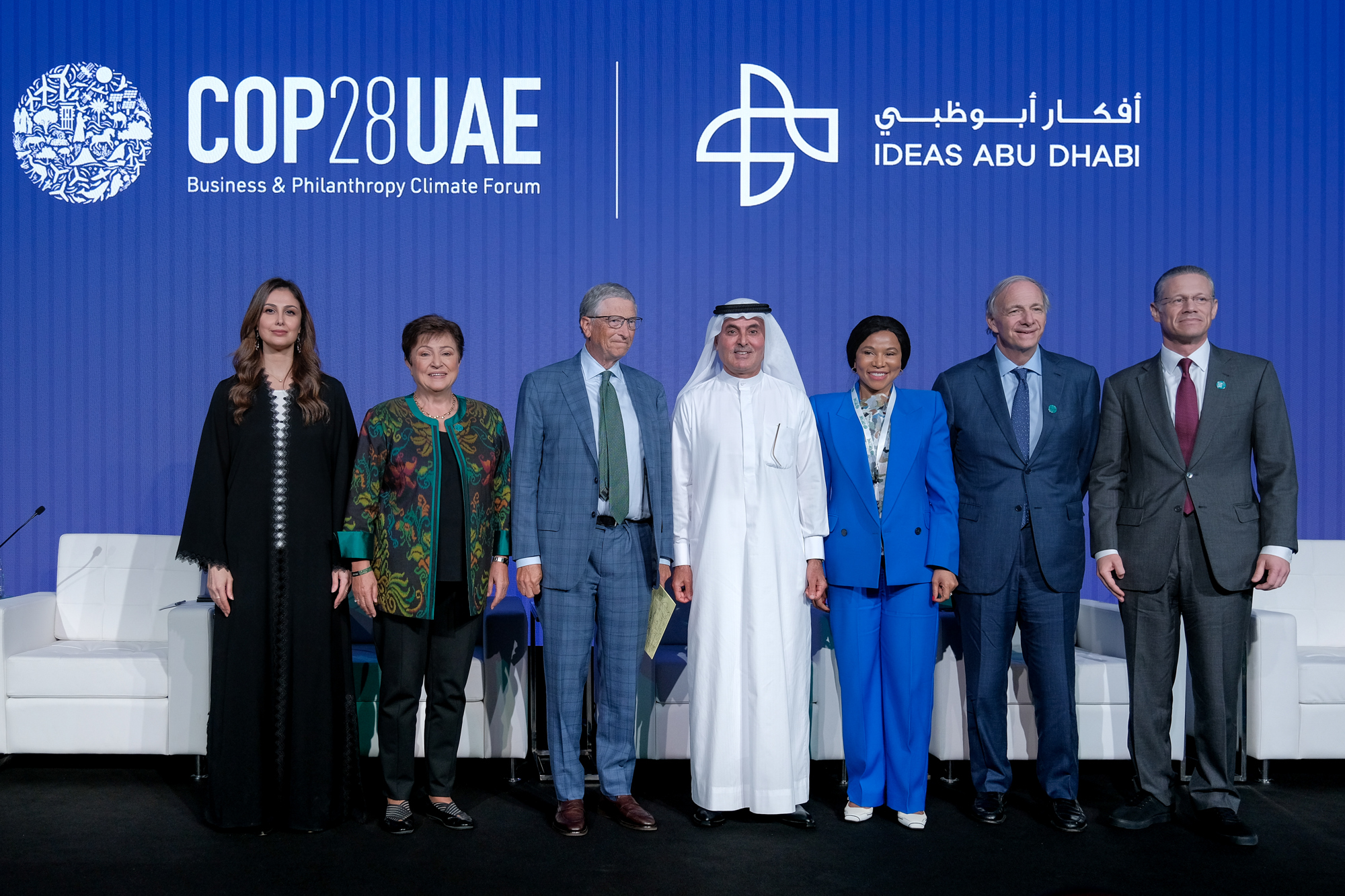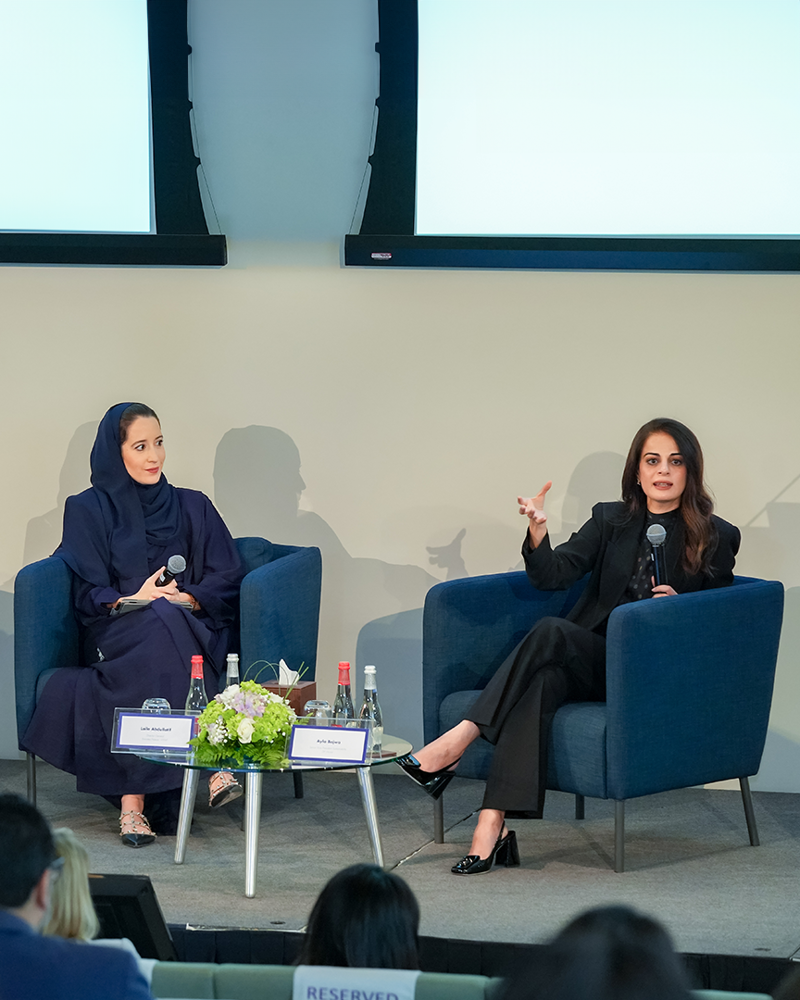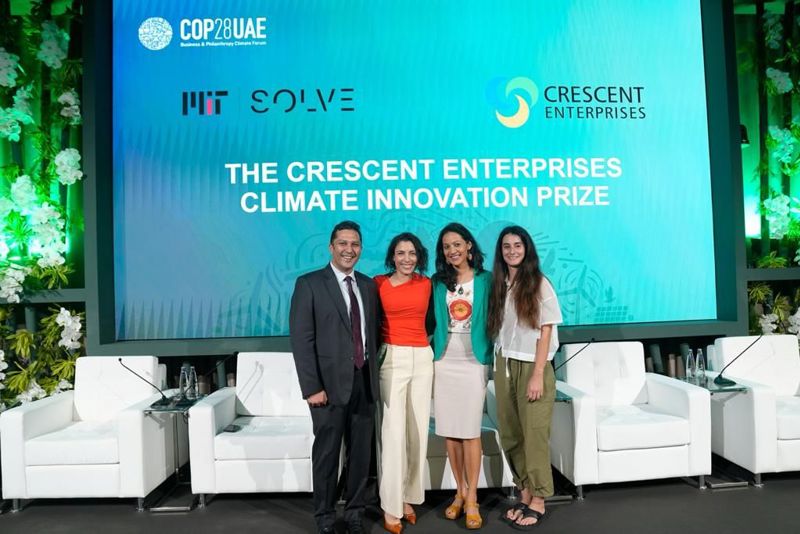Green jobs, climate-resilient agriculture, protecting the oceans, and educating the next generation. These were just some of the topics discussed during a high-level panel held at the Business and Philanthropy Climate Forum (BPCF) at COP28 in the UAE.
Emirati philanthropist Abdul Aziz Al Ghurair, the chairman of the Abdulla Al Ghurair Foundation (AGF) joined Bill Gates, co-chair of the Bill and Melinda Gates Foundation, South African philanthropist Precious Moloi-Motsepe, and Ray Dalio, founder of Dalio Philanthropies for a discussion moderated by Rima Al Mokarrab, co-chair of Ideas Abu Dhabi and chair of Tamkeen, a UAE thought-leadership platform overseen by Tamkeen, in association with the Aspen Institute.
Introducing the panel, Badr Jafar, BPCF chair and COP28 special representative for Business and Philanthropy, described climate philanthropy as “the glue that binds business, governments and civil society in concerted action” towards a net zero goals.
“Philanthropic capital is more flexible, risk tolerant and patient than other forms of capital,” he told the Green Zone event. “When strategically deployed de risking follow on investments, it can generate a catalytic effect by unlocking much larger pools of capital.”
The discussion that followed explored the role for philanthropy in fighting climate change, and how it can be leveraged to support green growth, the strengthening of human capital, and the acceleration and refinement of research and development to future-proof food systems and our natural environment.
“Philanthropic capital is more flexible, risk tolerant and patient than other forms of capital."
Badr Jafar, COP28 special representative for Business and Philanthropy
"It is difficult to overstate the magnitude of the climate challenge faced by farmers and food systems,” Bill Gates told the audience. “This is especially true in low-income regions, where the people who have done the least to contribute to climate change are suffering the most.”
But he added: “While there are many innovations available that could help farmers adapt to climate threats, there hasn’t been enough funding to make them widely available. By bringing private and public sectors together, we can ensure innovations in agricultural adaptation get the funding they need."
Ray Dalio, the funder of exploration vessel Ocean X, spoke about the importance of conserving the world’s oceans, which he described as “our biggest, most important, and least explored natural asset” and said: “We can’t think about climate and our environment without thinking about the ocean.”
Backing Gates’s call for a double bottom line approach to raising capital, Dalio said: “I think we’re at the tip of the iceberg if we look at emerging new technologies that are become great investments”, a surefire way, he said, to attract private capital into climate-related initiatives.
Emirati philanthropist Abdul Aziz Al Ghurair, meanwhile, outlined how the Abdulla Al Ghurair Foundation - stablished almost a decade ago by his father to fund education for Arab youth - had recently shifted from supporting individuals with scholarships to focusing on building capacity in education systems to deliver impact on a wider scale. Working with universities and ministries of education was a way, he explained, to scale the potential impact of gifted dollars and to help equip the next generation to be able to address climate action.
For her part, Precious Moloi-Motsepe spoke about how her experience as a medical doctor had shaped her understanding of the urgent need for the African perspective to be taken into consideration by global researchers, especially due to the importance of understanding the local context.
Moloi-Motsepe, chancellor of the University of Cape Town and co-chair of the Motsepe Foundation also stressed the important of leveraging Africa’s demographic dividend. “We have to give hope to this young generation. And at the same time, we have to ensure that the U.N. Sustainable Development Goals in their totality are achieved within the set time,” she said.
Concluding, Dalio said: “We have an enormous amount of resources and enormous amount of brilliance… but I think everything comes down to how people are with each other.” We called for a co-ordinated - rather than polarized approach - and a focus on the “greater good” over “individual good”, he said.
Ideas Abu Dhabi was established in 2017 as a Forum that welcomes global thinkers, visionaries, innovators, and policymakers to hold intimate dialogues around some of the world’s greatest challenges.
Tamkeen is an Abu Dhabi company that partners with leading local and international institutions to deliver projects that enrich the emirate’s social, cultural and educational landscape in support of its Economic Vision 2030.
The Aspen Institute is a US-based educational and policy studies organization that has gained a reputation for gathering together diverse, nonpartisan thought-leaders, creatives, scholars and members of the public in order to address some of the world’s most complex problems.




